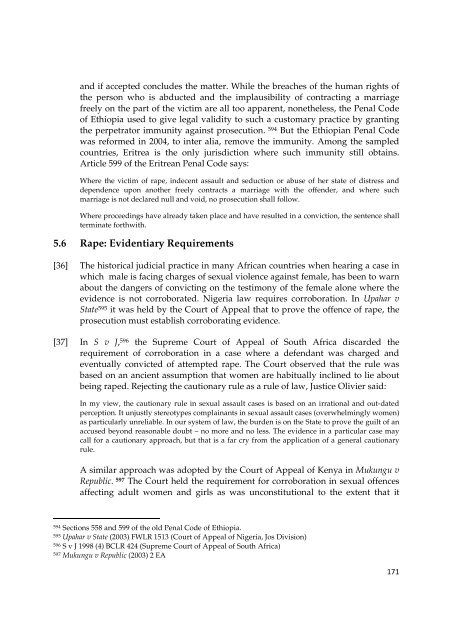sexual health and human rights in the african region - The ICHRP
sexual health and human rights in the african region - The ICHRP
sexual health and human rights in the african region - The ICHRP
Create successful ePaper yourself
Turn your PDF publications into a flip-book with our unique Google optimized e-Paper software.
<strong>and</strong> if accepted concludes <strong>the</strong> matter. While <strong>the</strong> breaches of <strong>the</strong> <strong>human</strong> <strong>rights</strong> of<br />
<strong>the</strong> person who is abducted <strong>and</strong> <strong>the</strong> implausibility of contract<strong>in</strong>g a marriage<br />
freely on <strong>the</strong> part of <strong>the</strong> victim are all too apparent, none<strong>the</strong>less, <strong>the</strong> Penal Code<br />
of Ethiopia used to give legal validity to such a customary practice by grant<strong>in</strong>g<br />
<strong>the</strong> perpetrator immunity aga<strong>in</strong>st prosecution. 594 But <strong>the</strong> Ethiopian Penal Code<br />
was reformed <strong>in</strong> 2004, to <strong>in</strong>ter alia, remove <strong>the</strong> immunity. Among <strong>the</strong> sampled<br />
countries, Eritrea is <strong>the</strong> only jurisdiction where such immunity still obta<strong>in</strong>s.<br />
Article 599 of <strong>the</strong> Eritrean Penal Code says:<br />
Where <strong>the</strong> victim of rape, <strong>in</strong>decent assault <strong>and</strong> seduction or abuse of her state of distress <strong>and</strong><br />
dependence upon ano<strong>the</strong>r freely contracts a marriage with <strong>the</strong> offender, <strong>and</strong> where such<br />
marriage is not declared null <strong>and</strong> void, no prosecution shall follow.<br />
Where proceed<strong>in</strong>gs have already taken place <strong>and</strong> have resulted <strong>in</strong> a conviction, <strong>the</strong> sentence shall<br />
term<strong>in</strong>ate forthwith.<br />
5.6 Rape: Evidentiary Requirements<br />
[36] <strong>The</strong> historical judicial practice <strong>in</strong> many African countries when hear<strong>in</strong>g a case <strong>in</strong><br />
which male is fac<strong>in</strong>g charges of <strong>sexual</strong> violence aga<strong>in</strong>st female, has been to warn<br />
about <strong>the</strong> dangers of convict<strong>in</strong>g on <strong>the</strong> testimony of <strong>the</strong> female alone where <strong>the</strong><br />
evidence is not corroborated. Nigeria law requires corroboration. In Upahar v<br />
State 595 it was held by <strong>the</strong> Court of Appeal that to prove <strong>the</strong> offence of rape, <strong>the</strong><br />
prosecution must establish corroborat<strong>in</strong>g evidence.<br />
[37] In S v J, 596 <strong>the</strong> Supreme Court of Appeal of South Africa discarded <strong>the</strong><br />
requirement of corroboration <strong>in</strong> a case where a defendant was charged <strong>and</strong><br />
eventually convicted of attempted rape. <strong>The</strong> Court observed that <strong>the</strong> rule was<br />
based on an ancient assumption that women are habitually <strong>in</strong>cl<strong>in</strong>ed to lie about<br />
be<strong>in</strong>g raped. Reject<strong>in</strong>g <strong>the</strong> cautionary rule as a rule of law, Justice Olivier said:<br />
In my view, <strong>the</strong> cautionary rule <strong>in</strong> <strong>sexual</strong> assault cases is based on an irrational <strong>and</strong> out-dated<br />
perception. It unjustly stereotypes compla<strong>in</strong>ants <strong>in</strong> <strong>sexual</strong> assault cases (overwhelm<strong>in</strong>gly women)<br />
as particularly unreliable. In our system of law, <strong>the</strong> burden is on <strong>the</strong> State to prove <strong>the</strong> guilt of an<br />
accused beyond reasonable doubt – no more <strong>and</strong> no less. <strong>The</strong> evidence <strong>in</strong> a particular case may<br />
call for a cautionary approach, but that is a far cry from <strong>the</strong> application of a general cautionary<br />
rule.<br />
A similar approach was adopted by <strong>the</strong> Court of Appeal of Kenya <strong>in</strong> Mukungu v<br />
Republic. 597 <strong>The</strong> Court held <strong>the</strong> requirement for corroboration <strong>in</strong> <strong>sexual</strong> offences<br />
affect<strong>in</strong>g adult women <strong>and</strong> girls as was unconstitutional to <strong>the</strong> extent that it<br />
594 Sections 558 <strong>and</strong> 599 of <strong>the</strong> old Penal Code of Ethiopia.<br />
595 Upahar v State (2003) FWLR 1513 (Court of Appeal of Nigeria, Jos Division)<br />
596 S v J 1998 (4) BCLR 424 (Supreme Court of Appeal of South Africa)<br />
597 Mukungu v Republic (2003) 2 EA<br />
171
















